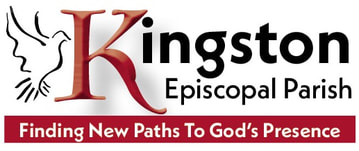Rector's Visions
The Rector's Visions are also published in our monthly newsletter, The Crier.
Archive 2022
|
When we were baptized, we (or our parents on our behalf) responded to a number of questions about how we will live our lives for God by saying “We will.” It is our covenant with God which we make before the people of God, our church family. But it’s not just our promise to God to always be good and right. Unless you’re wildly different from the way all human beings are described and understood in the Scriptures, you will invariably fail to always be good and right. You can’t do it on your own. So we actually say at our baptisms: “We will, with God’s help! We recognize that we can’t do it on our own. Our answer affirms the most important thing we are doing at baptism: we are choosing to live in deep relationship with the Divine. We will not depend just on our own ways of seeing and understanding. We will not act out of our own emotions and opinions without first connecting ourselves with the one who sees the much bigger picture, who is the much bigger picture.
We live in a time that honors individuals’ emotions and opinions in ways that are dangerous. The internet has allowed us to honor democratically the individual opinions in new and powerful ways. But it has also meant that we often simply believe whatever we want to believe without God’s bigger picture. In the early church, individual’s opinions and emotions were called “passions.” Without prayer and carefully connecting the fears and feelings and emotions of the individual with the life of God, people would go astray, wander into myths, hurt one another and themselves. We are seeing this in spades in our world today. In the historical Christian tradition, the image of the heart is not just the place for emotions. If we live only out of emotions and opinions, we live in “Peyton Place” or “As the World Turns.” Again, witness the daily news stream. The heart, in our tradition, is the place where intuitions meet prayer, emotions face God’s call to responsibility and love of neighbor, and individual opinions meet the Truth of God (which seldom settles so easily into a human-defined way of being either conservative or liberal). It is a place of much more hard work than a place where we simply react and live out of our own opinions or emotions, our “passions.” In- terestingly, that old world, passions itself comes from the same root word for passivity. Passions are simp- ly reacting out of our own immediate opinions and emotions which is always dangerous to ourselves, oth- ers, and our relationship with the Almighty. We are not called to live out of our fears or immediate personal desires, but we are called to live more deeply and truly out our binding our own understandings with the unknowable understanding of God. To be authentic human beings, to be truly alive, is not to live reactively out of our own personal opinions and emotions, but to engage ourselves in the larger life of God with all that we are. We can learn a lot from our emotions and reactive opinions if we examine them closely with the eyes of prayer and faith. They can show us the way to a deeper life. But if we simply live “passively” by them, we will lose our way and be- come distant from God and true life. Each day, it is good to arise and say: “Today, I will be, with God’s help” and then work at it. God’s Peace, Gary+
0 Comments
|
The Very Rev. Gary Barker
Archives
July 2022
|
